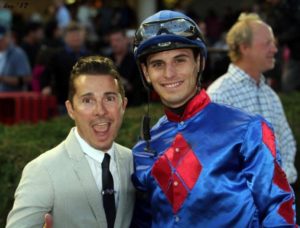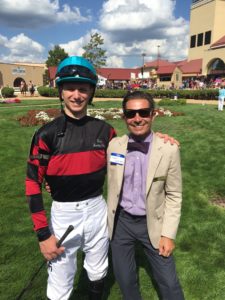Former jockey Mark Irving has more than 4,700 lifetime mounts and 600-plus career victories.
There’s one thing he has learned during his time riding massive animals while they are running 40 mph…
“If you lose, they always blame the jockey first,” Irving said with a laugh.
His knowledge of horse racing, easy charm and beguiling British accent have translated to a new role for Irving: Live Racing Ambassador for Canterbury Park.
“I wanted to stay involved with horse racing. I have so much passion for the sport still,” Irving said of his new position. “Giving VIP tours, speaking to groups, helping with betting, answering questions. I’m an extrovert and I love to educate people about horse racing and Canterbury Park.”
Telling His Story
Whether he’s talking at a Rotary Club meeting, corporate function or in a one-on-one tour of the paddock, Irving said he doesn’t lecture his audience.
“It’s not a speech — it’s telling a story,” he said. “I start out by saying, ‘Once upon a time.'”

That time generally begins in England, where Irving’s grandfather trained horses and he fell in love with the sport. He enjoyed traveling (and American football), and eventually headed to California as a jockey.
A trainer he knew in California, Neil Drysdale, had Irving travel with his horses and he later made his way to Canterbury Park, where he found success on the turf.
“Turf racing is much more popular (than dirt) in England,” Irving said. “Turf can be tough. The course can get a little shaky. The surface changes all the time and you have tighter turns.
“I used to walk the turf course every day. Randy Sampson (Canterbury Park CEO) told me he had never seen anyone do that before,” he said. “You want to find the right line.”
He found that right line plenty of times as a jockey, when he raced all over the U.S. and Europe, and even in Australia and New Zealand. These days, Irving is living in Minnesota, still connected to the sport where he found so much success.
Being a Jockey
What’s it like to be a jockey?
“There’s nothing like it,” Irving said. “You can’t explain it.”
Having friends who are racecar drivers, Irving said they’re often asked how they handle the speed.
“It’s like slow motion, like tunnel vision. It’s kind of the same for a jockey,” he said.
Even with the pounding of hooves and thousands in attendance, Irving said he hears essentially nothing during a horse race, except the roar of the crowd at the finish line during a big race.
Being atop a race horse requires split-second decision making, Irving said, and there’s plenty on the line.
“It’s obviously make or break,” he said. “You’re a hero or a zero.”
Talking Canterbury
When he’s giving people tours of the backside or speaking to a civic group, Irving said he primarily tries to convey one thing about Canterbury Park.

“First and foremost, it’s fun,” he said.
Irving said people can have fun at the track without even betting — simply enjoying the company of friends and family in an exciting setting, outside with a hotdog and a drink.
At the same time, Canterbury Park wants guests to win their wagers, he said, so some of his discussions center on identifying strong horses. Irving said he looks for things beyond the racing form, such as the physical composition of a horse.
He uses his knowledge of American football to make analogies for people.
“A sprint horse, you want to look like a running back. Good quickness over short distances. You want to see a big rear end, like a V8. A big motor, you know?” Irving said.
For horses that run a mile or longer, he looks for animals that are taller and learner, “more like a wide receiver,” he said.
“That’s how I explain it to the public,” Irving said.
And, with his proper accent formed by elocution classes as a child…
“The thing about being British, people tend to listen,” he said.
You can find more information about booking Irving on the Canterbury Park website.
